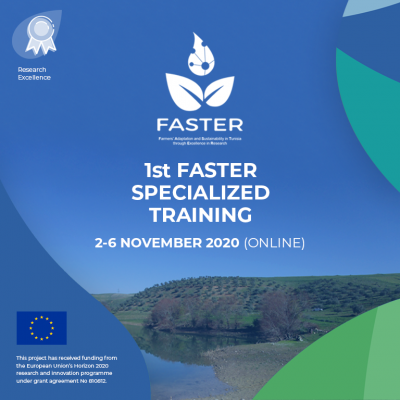
Last week, from the 2nd to the 6th of November, FASTER held an online event, its 1 st specialized training under the leadership of CREAF and 7 of its experts. The training was held to tackle the project’s goal of reinforcing the research and knowledge transfer capacity of INRGREF and the associated Tunisian partners in relation to innovative land and water management in view of climate change.
The training had two different target groups: students and researchers, both from INRGREF, IRESA AVFA and associated partners. A total of 30 participants attended, most of them being researchers, and from different associated centres as mentioned. The training consisted not only of lectures but also focused on interactive exercises and discussions. All in all, the training covered 30 hours, half of which consisted of virtual training as well as individual or group tasks). The participation and level of engagement were very high, and many participants provided interesting insights on the different concepts discussed.
The training revolved around six main topics and have seen the participation of specialized and international lecturers. Here is an overview of the different lectures held for each particular topic:
1) Climate change impacts at global scale, and in the Mediterranean
This session had both the aims of supplying knowledge regarding climate change effects, as well as of analysing the causes and the observed changes at global and Mediterranean scales.
2) Water and forest management and climate change adaptation
During this particular lecture, the main topic discussed was water and forest ecosystems vulnerability in terms of climate change, and therefore outlined, the required tools, approaches and research settings to study this vulnerability. Moreover, it also provided an analysis of innovative solutions in order to adapt agro-forest systems to climate change in the Mediterranean basin.
3) Design and evaluation of adaptation measures
This course provided not only theoretical but also practical knowledge and methodologies to design, test and evaluate adaptation measures in the agriculture, forestry and water management sectors.
4) Landscape management
Through historical examples and interactive activities, this session had the main goal of focusing attention on considering landscapes as a single unit of management, sharing GIS and remote sensing tools and approaches for applied landscape and water management.
5) Innovative governance for adaptation
This course introduced the concepts of adaptive management, a structured, iterative process of robust decision making in the face of uncertainty, such as the impacts of climate change.
6) Water management policy analysis
This final lecture provided an introduction to water policy analysis, considering international references and examples from the EU context.
These different training sessions successfully provided knowledge and tools to increase research performance indicators. The next edition of the specialized training by FASTER will most probably take place during the autumn of 2021 and will be imparted by Lund University lecturers.
Meanwhile, FASTER will keep working on increasing the research excellence of INRGREF, as well as developing a knowledge transfer framework through other sets of activities!
To learn more about our commitment with #ResearchExcellence, follow #FASTERH2020 on Facebook and Twitter
Subscribe to our Newsletter to stay informed about the activities carried out by the project.


